In the middle of this month, the Ethiopian capital, Addis Ababa, will host a new round, which may be the last in a series of meetings held by Egypt, Sudan, and Ethiopia following the resumption of negotiations after stopping for two years, with the aim of “reaching an agreement” regarding the operation of the Ethiopian Renaissance Dam. The Egyptian Minister of Water Resources and Irrigation, Hani Sweilem, said on Saturday that the new round of negotiations will be held in the Ethiopian capital during the period from 16 to 18 December.
Egyptian President Abdel Fattah El-Sisi and Ethiopian Prime Minister Abiy Ahmed agreed, on the sidelines of the summit of Sudan’s neighboring countries in Cairo, last July, to initiate “urgent” negotiations to finalize the agreement to fill the “Renaissance Dam” and the rules for its operation, and they also agreed. “To make all necessary efforts to finalize the agreement within 4 months.”
During the past months, 3 negotiating rounds were held in Cairo and Addis Ababa, but “they did not witness anything new in light of Ethiopian stubbornness,” according to a previous statement by the Egyptian Ministry of Water Resources and Irrigation, which expressed its hope that “the Ethiopian side in the negotiations will demonstrate political will and seriousness in… Reaching a binding legal agreement to fill and operate the dam.”
Areas suffering from water stress
During his speech at the International Conference of States Parties to the Climate Convention, currently held in Dubai, Minister Sweilem pointed out that two-thirds of the population of the Middle East and North Africa region live in areas suffering from water stress, calling for the necessity of relying on renewable energy to make water desalination for food production economically feasible. Using desalinated water with the highest economic efficiency, and safely dealing with highly salty water resulting from the desalination process instead of dumping it in the seas and oceans. The Egyptian Minister confirmed that his country is witnessing a decline in the per capita share of water, approaching the “water scarcity line,” with a large gap between resources and needs, which is being dealt with through major projects to reuse agricultural wastewater, in addition to importing agricultural products from abroad.
Egypt and Sudan (the two countries at the mouth of the Nile River) entered into negotiations with Ethiopia (the upstream country) for more than a full decade, but Ethiopia continued to build and fill the dam without an agreement with the two downstream countries, which confirm that they were exposed to “serious damage” due to Ethiopia’s continued construction work. Filling without formatting. Ethiopia completed the fourth filling of the dam last September, while last November it began draining the middle corridor in preparation for the fifth filling. The volume of water that has been stored has reached 41 billion cubic meters of water so far in 4 years, while the storage capacity is estimated The total capacity of the dam is 74 billion cubic meters of water.

The opportunity “still exists”
For his part, an expert in international law and international disputes who specializes in water issues, Mohamed Mahmoud Mahran, confirmed that the chances of success of the next round of negotiations regarding the “Renaissance Dam” “still exist,” if Ethiopia commits to “good faith and accepts reaching an agreement.” It takes into account the water interests of the downstream countries.”
Mahran explained to Asharq Al-Awsat that international law imposes clear obligations on Ethiopia regarding the “Renaissance Dam,” most notably “not to harm the interests of the countries bordering the Nile River,” noting that if the next round of negotiations fails, Egypt’s alternatives are “to seek refuge.” To the United Nations Security Council and the United Nations General Assembly, in order to issue a resolution condemning Ethiopian actions regarding the dam, and to put pressure on it with the aim of obliging it to negotiate in good faith to reach a legal agreement binding on all parties regarding the dates for filling and operating the dam.”
According to Mahran, the United Nations Convention on the Uses of International Watercourses of 1997 obligates countries “not to take any unilateral measures regarding international watercourses that would cause harm to other countries,” noting that the “Agreement of Principles” concluded in Sudan in 2015 also confirms this. .

Continued international pressure
The expert specializing in water issues stressed “the necessity of continuing international pressure and resorting to the UN Security Council to bear its responsibilities in protecting Egypt’s water security and its historical rights to the waters of the Nile, and the intervention of the international community and international and regional organizations, so that this conflict affects international peace and security, and so that Ethiopian actions do not become precedents.” And customs that could be adopted by other countries in a flagrant violation of the principles and rules of international law.”
It is noteworthy that Egypt had submitted a complaint to the Security Council against Ethiopia after the end of the fourth filling, where it confirmed that Addis Ababa’s “unilateral” actions regarding the filling and operation of the dam “constitute an existential war for Egypt and threaten its stability,” as Egypt depends on the Nile River to secure 97% of percent of its water needs, and water coming from the Blue Nile represents the largest share of its water resources.
Egypt resorted to the Security Council in July 2020, but the latter merely urged the three countries to resume negotiations, at the invitation of the President of the African Union, with the aim of developing a final formula for an acceptable and binding agreement for the parties, as a matter of urgency, regarding filling and operating the “Renaissance Dam”, within a time frame. Reasonable, which has not been achieved yet.
2023-12-03 16:04:59
#chances #success #Ethiopian #Dam #negotiations


